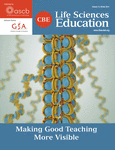American Society of Plant Biologists: Position Statement on the Education of Young Children about Plants
To the Editor:
The American Society of Plant Biologists (ASPB) embraces the plant science education of all ages, but I want to draw particular attention to our efforts on behalf of young children and their teachers. In the recent special-focus section on plant science teaching and learning, CBE—Life Sciences Education published several pieces that touch on educating young children about plants (September 2014), including a favorable review of the book My Life as Plant, by Alan M. Jones and Jane Ellis. The book was designed to provide learning opportunities for children that engage and inform. ASPB was instrumental in supporting development of the book (available for free at http://my.aspb.org/?page=My_Life_As_A_Plant). Our society leadership takes the education of children very seriously, as is illustrated by the fact that one of the authors, Alan Jones, was the 2013–2014 president of ASPB.
Childhood is the time when inaccurate ideas about plants can be established, leading to adults with persistent errors in thinking about how plants live and grow. Yet children are very capable of learning about plants when given instruction and encouraged by teachers and parents to explore and study. ASPB feels such instruction is urgently needed, and we will be posting a position statement on educating young children about plants at our website. The statement is appended below for LSE readers. We invite LSE readers to visit the education link at the ASPB website (http://my.aspb.org/?page=Education), where a variety of plant education resources can be found.
ASPB POSITION STATEMENT ON PLANT BIOLOGY IN THE EARLY EDUCATION OF CHILDREN
The ASPB urges the educators and parents of young children to actively promote learning about plants and to create formal and informal opportunities for them to explore and experiment with plants. Like all animals, humans depend on plants for survival—plants are the basis of our food supply and are the original source of energy in most ecosystems. Plants affect the amount of carbon dioxide in our atmosphere and will be important in our strategies to mitigate climate change. A basic understanding of how plants live and grow is essential as we plan for the uncertainties in our future; early childhood is the ideal time to begin that training.
Sadly, children in the United States perform poorly on assessments regarding their understanding of both plants and the life sciences in general. For example, data from the National Center for Education Statistics from 2009 show that the national average score on the life sciences assessment for grade 4 students was 150 out of 300—a failing grade of 50%! Children develop misconceptions about plants early (Barman et al., 2006), and work by Goldberg and Thompson-Schili (2009) suggests that conceptual misunderstandings established in childhood permeate the perceptions about plants held by adults.
The good news is that the errors children develop in their thinking can be corrected (Ronchi et al., 2012), and early educational experiences are key. The National Science Teachers Association (2014) states,
Current research indicates that young children have the capacity for constructing conceptual learning and the ability to use the practices of reasoning and inquiry … Many adults, including educators, tend to underestimate children's capacity to learn science core ideas and practices in the early years and fail to provide the opportunities and experiences for them to foster science skills and build conceptual understanding … Also underestimated is the length of time that young children are able to focus on science explorations. Effective science investigations can deeply engage young children for extended periods of time, beyond a single activity or session.
Our children are able and ready to learn about plants from the earliest ages, to observe them in their natural surroundings, and to experiment with them as they develop their reasoning skills. Teachers and parents should promote this learning, and ASPB provides support as follows:
ASPB provides a variety of educational resources for teachers, parents and children at its website (http://my.aspb.org/?page=Education).
ASPB funds education projects, many of which include professional development and teacher training as an integral component (https://bloome.aspb.org). We support projects that emphasize evidence-based teaching methods and that include measures of educational efficacy.
ASPB hosts exhibits with resources and information at national science events for families (American Association for the Advancement of Science Family Days, White House Easter Egg Roll, USA Science & Engineering Festival) and educators (National Association of Biology Teachers and National Science Teachers Association).
By consciously including many learning opportunities about plants, teachers and parents can insure that children accurately understand how plants live and grow and comprehend how essential they are to our well-being. As adults, they will be better prepared—for growing and enjoying plants in their own gardens and for making decisions about our world that will affect the generations to come.



